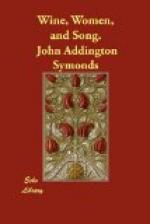Lo, the Spring of life slips by,
Frozen Winter comes apace;
Strength is ’minished silently,
Care writes wrinkles on our face:
Blood dries up and courage fails us,
Pleasures dwindle, joys decrease,
Till old age at length assails us
With his troop of illnesses.
Like a dream our prime is flown,
Prisoned in a study;
Sport and folly are youth’s own,
Tender youth and ruddy.
Live we like the gods above;
This is wisdom, this is truth:
Chase the joys of tender love
In the leisure of our youth!
Keep the vows we swore together,
Lads, obey that ordinance;
Seek the fields in sunny weather,
Where the laughing maidens dance.
Like a dream our prime is flown,
Prisoned in a study;
Sport and folly are youth’s own,
Tender youth and ruddy.
There the lad who lists may see
Which among the maids is kind:
There young limbs deliciously
Flashing through the dances wind:
While the girls their arms are raising,
Moving, winding o’er the lea,
Still I stand and gaze, and gazing
They have stolen the soul of me!
Like a dream our prime is flown,
Prisoned in a study;
Sport and folly are youth’s own,
Tender youth and ruddy.
XV.
A separate Section can be devoted to songs in the manner of the early French pastoral. These were fashionable at a remote period in all parts of Europe; and I have already had occasion, in another piece of literary history, to call attention to the Italian madrigals of the fourteenth century composed in this species.[30] Their point is mainly this: A man of birth and education, generally a dweller in the town, goes abroad into the fields, lured by fair spring weather, and makes love among trees to a country wench.
The Vagi turn the pastoral to their own purpose, and always represent the greenwood lover as a clericus. One of these rural nieces has a pretty opening stanza:—
“When the sweet Spring was ascending,
Not yet May, at April’s ending,
While the sun was heavenward wending,
Stood a girl of grace transcending
Underneath the green bough, sending
Songs aloft with pipings.”
Another gives a slightly comic turn to the chief incident.
FOOTNOTES:
[Footnote 30: See Renaissance in Italy, vol. iv. p. 156.]
A PASTORAL.
No. 24.
There went out in the dawning
light
A little rustic
maiden;
Her flock so white, her crook
so slight,
With fleecy new
wool laden.
Small is the flock, and there
you’ll see
The she-ass and
the wether;
This goat’s a he, and
that’s a she,
The bull-calf
and the heifer.




